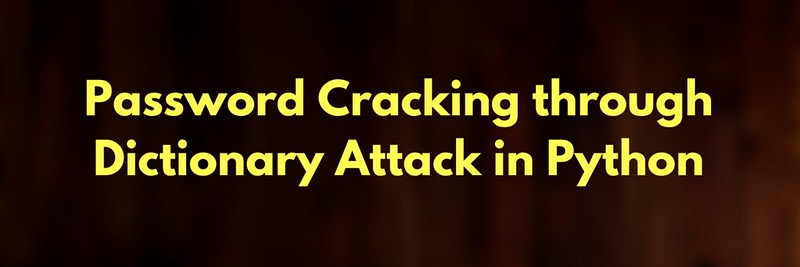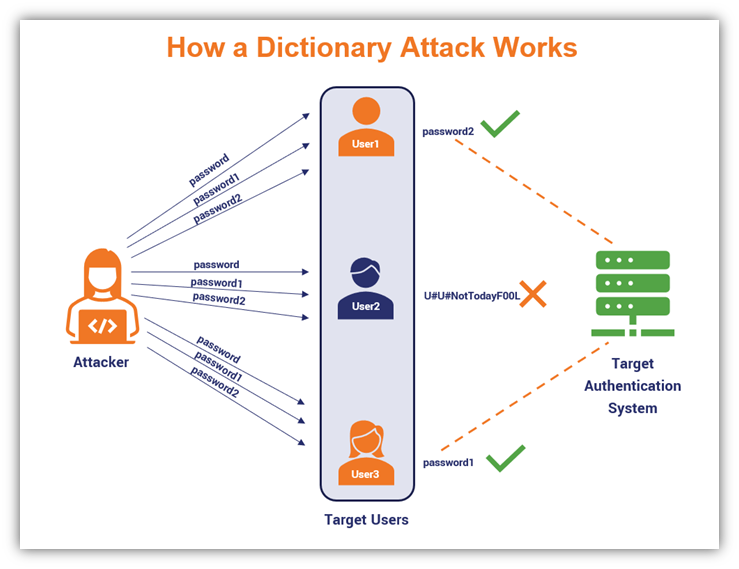
- #Dictionary attack any password cracker
- #Dictionary attack any password software
- #Dictionary attack any password password
- #Dictionary attack any password crack
- #Dictionary attack any password windows
The above screen shows that it can be a MD5 hash and it seems a Domain cached credential.
#Dictionary attack any password windows
For example, if I have a HASH, it can tell me if it is a Linux or windows HASH. It is a tool that is used to identify types of hashes, meaning what they are being used for.

#Dictionary attack any password password
Then load the file with the password and click “start” until it finishes. Under “Target Account”, enter the username. Under “Target IP Server”, enter the IP of the server holding the SQL. To open it, open the terminal and type “sqldict”. It is a dictionary attack tool for SQL server and is very easy and basic to be used. Rcrack path_to_rainbow_tables -f path_to_password_hash
#Dictionary attack any password crack
The command to crack a hash password is − To open it, go to Applications → Password Attacks → click “rainbowcrack”. Generally, Rainbow tables are bought online or can be compiled with different tools. Rainbow tables are ordinary files stored on the hard disk.
#Dictionary attack any password software
The RainbowCrack software cracks hashes by rainbow table lookup. In case of unshadowing the password, we need to write the following command unshadow passwd shadow > unshadowed.txt To start it, open the Terminal and type “john”. John is a command line version of Johnny GUI. In this case, we will get the password of Kali machine with the following command and a file will be created on the desktop.Ĭlick “Open Passwd File” → OK and all the files will be shown as in the following screenshot.Īfter the attack is complete, click the left panel at “Passwords” and the password will be unshaded.

To open it, go to Applications → Password Attacks → johnny. Generally, it is used for weak passwords. A dictionary attack is a basic form of brute force hacking in which the attacker selects a target, then tests possible passwords against. Johnny is a GUI for the John the Ripper password cracking tool. Where –V is the username and password while tryingĪs shown in the following screenshot, the username and password are found which are msfadmin:msfadmin Johnny usr/share/wordlists/metasploit/ passwords –V Hydra -l /usr/share/wordlists/metasploit/user -P We have created in Kali a word list with extension ‘lst’ in the path usr\share\wordlist\metasploit. In this case, we will brute force FTP service of metasploitable machine, which has IP 192.168.1.101 It will open the terminal console, as shown in the following screenshot.

To open it, go to Applications → Password Attacks → Online Attacks → hydra.
#Dictionary attack any password cracker
Hydra is a login cracker that supports many protocols to attack ( Cisco AAA, Cisco auth, Cisco enable, CVS, FTP, HTTP(S)-FORM-GET, HTTP(S)-FORM-POST, HTTP(S)-GET, HTTP(S)-HEAD, HTTP-Proxy, ICQ, IMAP, IRC, LDAP, MS-SQL, MySQL, NNTP, Oracle Listener, Oracle SID, PC-Anywhere, PC-NFS, POP3, PostgreSQL, RDP, Rexec, Rlogin, Rsh, SIP, SMB(NT), SMTP, SMTP Enum, SNMP v1+v2+v3, SOCKS5, SSH (v1 and v2), SSHKEY, Subversion, Teamspeak (TS2), Telnet, VMware-Auth, VNC and XMPP). Here’s one answer to those hackers who sully the reputation of the dictionary: use really unusual words with rare letter combinations that are easier to remember than an incomprehensible string-and can have funny meanings.In this chapter, we will learn about the important password cracking tools used in Kali Linux.

We aspire to reclaim the power of the dictionary for the protection of online safety. It would be hard to find that string of letters anywhere else, which makes it almost impossible to hack into. Google uses the example of the famous line from Hamlet: To be or not to be that is the question. You could try an abbreviation of your favorite song lyric or your parents’ and siblings’ initials. So what should you do to protect your online accounts? Google recommends that you use an unusual string of letters. He found that using the 1,000 most common words in the dictionary an algorithm could correctly guess the passwords of up to 10% of the users. Turns out that many of us choose passwords that are relatively easy to remember and based on common words, and hackers can guess your password using a database of words (usually a dictionary of some sort). The passwords were separated from their usernames.) Bonnea used the passwords to test possible hacking attempts. In a recent study at Cambridge University, computer scientist Joseph Bonnea analyzed 70 million passwords from Yahoo! users. And we have no one to blame but ourselves. With a smart algorithm and a dictionary, hackers are finding it surprisingly easy to guess passwords. And since one way hackers fish out passwords is by using a dictionary attack (a name that brings shame to the honorable profession of lexicography), we’re always on high alert here. What is a dictionary attack? How can a benign book of meanings be used to uncover passwords? Each attack feels personal, especially if you’re one of the many people that has one password across several sites, whether it’s Facebook or LinkedIn, e-mail or a bank account. It seems like there’s always a new story on millions of passwords being hacked.


 0 kommentar(er)
0 kommentar(er)
